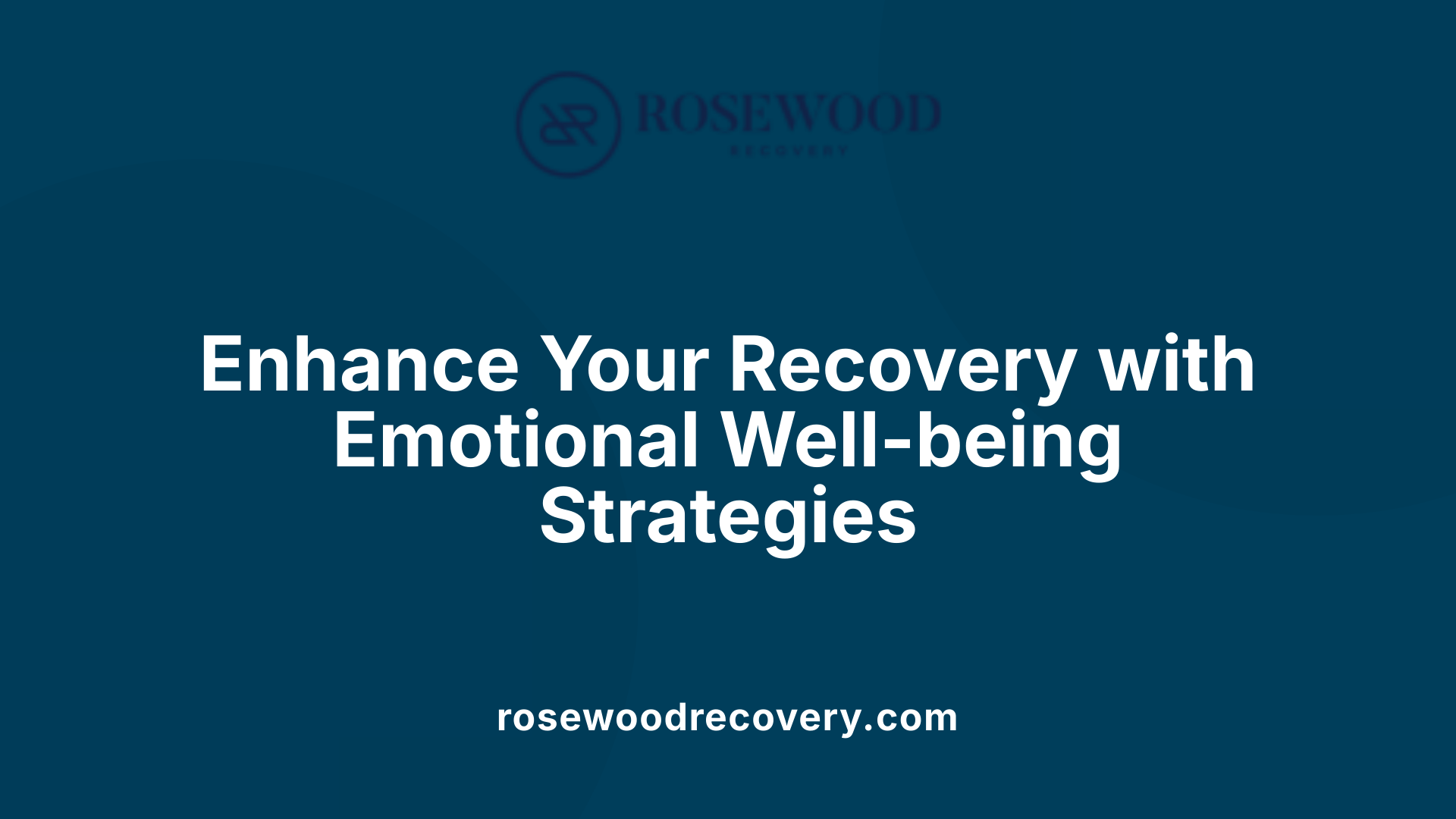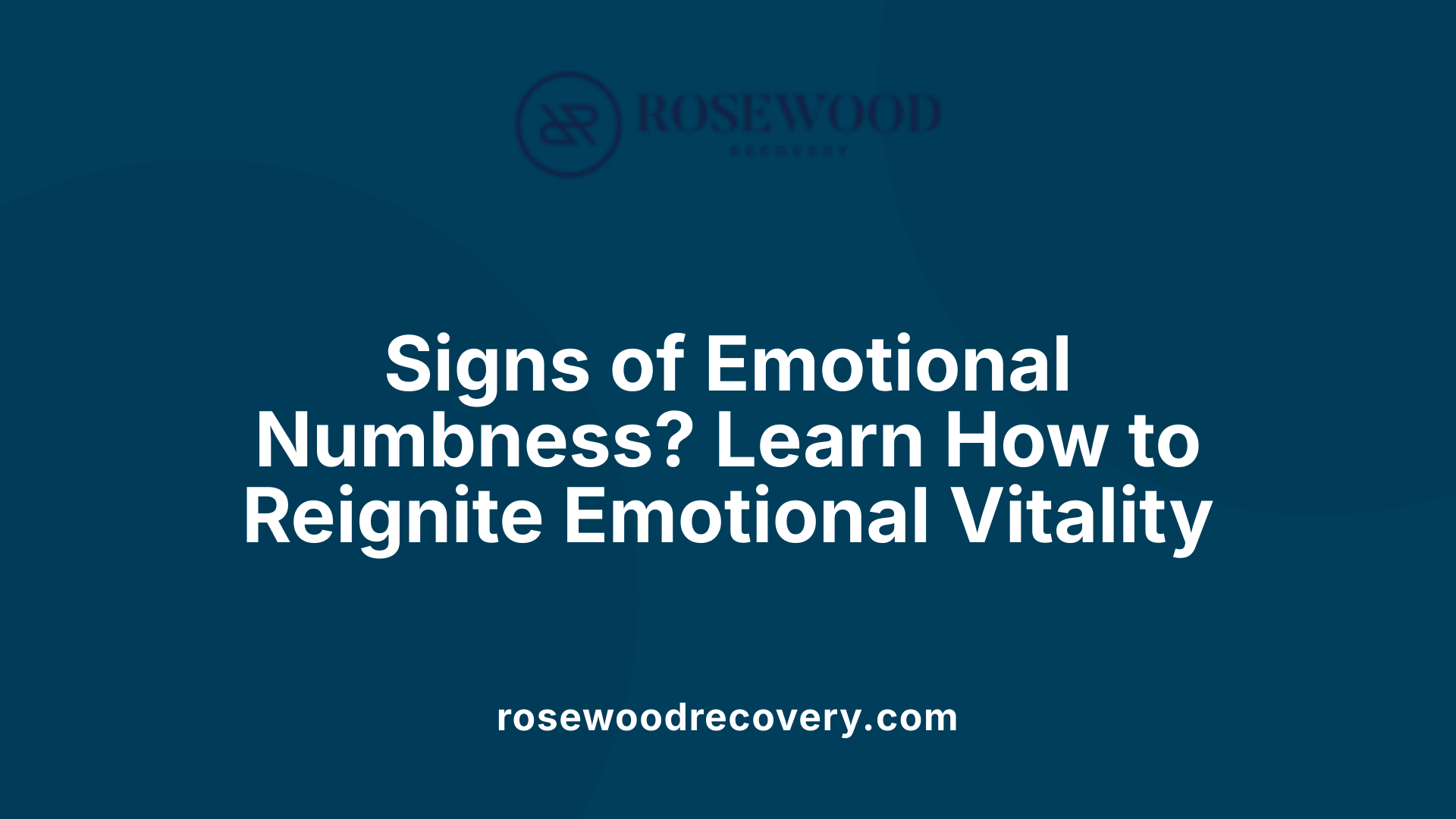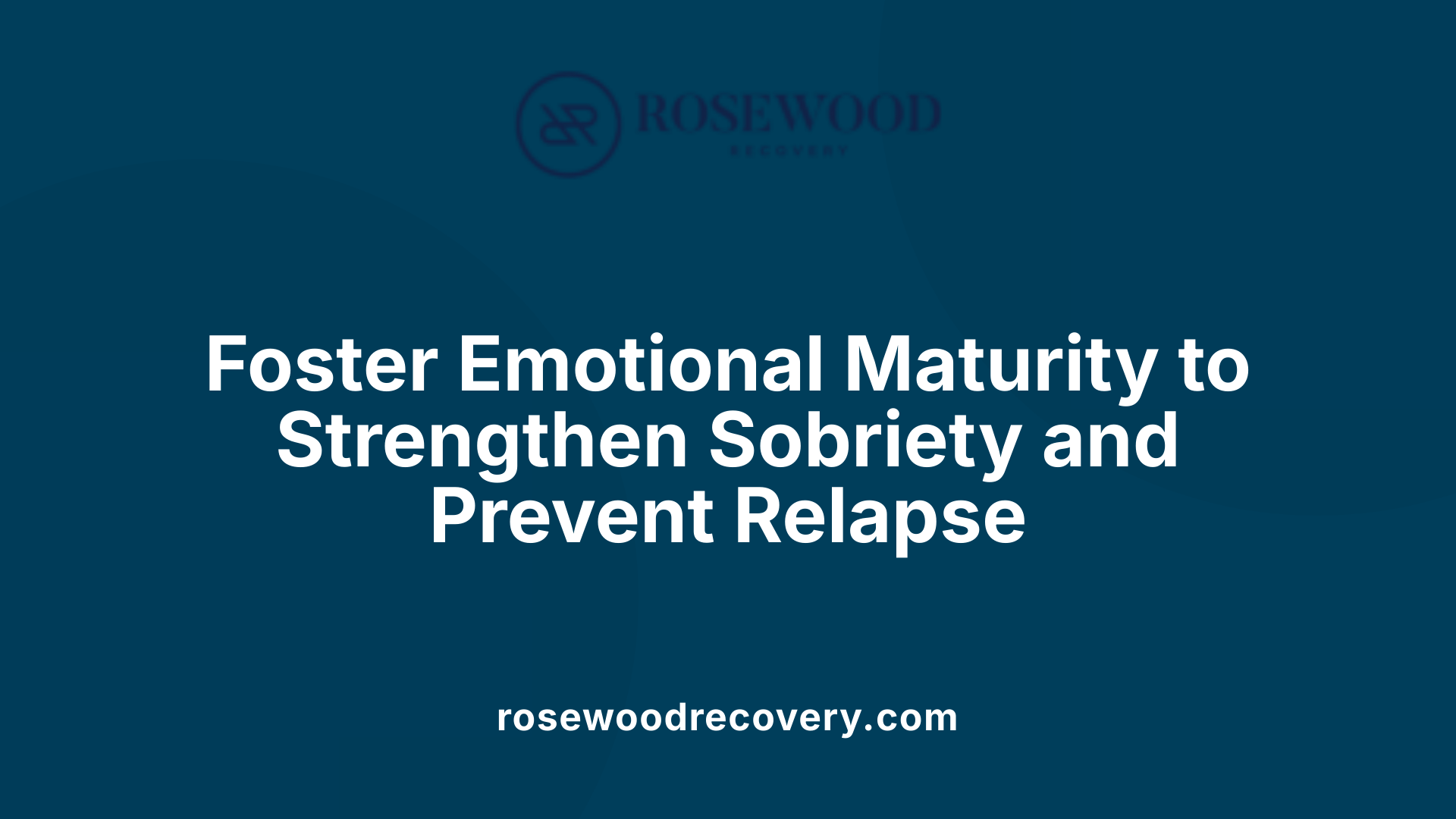Understanding the Key Indicators of Emotional Maturity
Emotional growth plays a crucial role in long-term recovery from addiction. This process involves developing crucial skills such as emotional intelligence, resilience, and self-awareness, which help individuals manage stress, prevent relapse, and foster a fulfilling life beyond substance dependence. Evaluating this growth requires a comprehensive approach that integrates self-assessment, behavioral observations, therapeutic insights, and biological understanding.
The Significance of Emotional Well-being in Recovery

How does positive affect influence health outcomes?
Positive affect, or experiencing feelings like joy, gratitude, and hope, has been shown to significantly improve health results. Research indicates that individuals with higher levels of emotional well-being tend to recover more effectively from physical illnesses and have a better chance of survival.
Meta-analyses reveal that emotional well-being contributes to better physical health, with observed positive effects lasting over approximately four years. These benefits include not only physical recovery but also a long-term prognosis, indicating that emotional health plays a crucial role in overall health trajectories.
In what ways does emotional well-being impact recovery prognosis?
Patients with higher emotional well-being often show enhanced recovery rates and improved survival odds. The likelihood ratio for recovery is around 1.14, which increases to approximately 1.18 after removing an outlier, highlighting a small but meaningful effect.
This suggests that emotional health acts as a predictor of outcomes in various health conditions. While the precise mechanisms are complex, the consistent association underscores the importance of fostering positive emotional states during treatment.
How does emotional health support physical health through biological mechanisms?
Emotional well-being influences bodily systems directly by activating the autonomic nervous system and the Hypothalamic–Pituitary–Adrenal (HPA) axis. These systems regulate stress responses, immune function, and cardiovascular health.
A positive emotional state buffers stress, reducing the adverse effects of chronic stress exposure and bolstering immune defenses. Indirectly, emotional well-being encourages healthier behaviors such as better nutrition, regular physical activity, and maintaining social connections, all of which contribute to improved health outcomes.
Furthermore, interventions aimed at enhancing well-being — like Acceptance and Commitment Therapy and well-being therapy — show promise in improving recovery and increasing the chances of survival. These strategies may modify emotional health, thereby positively affecting biological pathways.
Do the effects of emotional well-being vary across different health outcomes?
The influence of emotional well-being on disease prognosis may differ depending on specific health conditions, disease severity, age, and gender. Though these variables require further research, existing evidence suggests that emotional health exerts a generally positive impact across various patient populations.
Can improving emotional well-being be part of treatment plans?
Absolutely. Integrating psychological interventions that promote emotional well-being can be a valuable component of comprehensive medical care. Approaches such as acceptance-based therapies, mindfulness exercises, and social engagement initiatives are designed to bolster emotional health.
These interventions not only help patients cope with their illness but can also improve biological responses that facilitate recovery, ultimately contributing to better survival rates.
| Aspect | Effect | Supporting Mechanism | Intervention Examples |
|---|---|---|---|
| Emotional well-being | Enhances recovery, survival | Activates stress-buffering systems, improves health behaviors | Well-being therapy, mindfulness, Acceptance and Commitment Therapy |
| Biological impact | Reduces stress, strengthens immune and cardiovascular functions | Activates autonomic nervous system, HPA axis | Mindfulness exercises, relaxation techniques |
| Social engagement | Improves mental state, supports immune function | Builds social support networks | Support groups, family therapy |
| Long-term prognosis | Better health outcomes over years | Sustained positive emotional states | Ongoing psychological support, resilience training |
Understanding the multifaceted influence of emotional well-being underscores the importance of addressing mental health alongside physical treatment, fostering a holistic approach to recovery and long-term health maintenance.
Measuring Emotional Growth: Methods and Criteria
What are effective methods and criteria for evaluating emotional growth during long-term recovery?
Assessing emotional development in individuals recovering from addiction involves a variety of approaches to capture changes accurately. Self-report questionnaires are among the most common tools used. The Difficulties in Emotion Regulation Scale (DERS) measures how well a person manages their emotional responses, highlighting improvements in impulse control and emotional awareness. Similarly, the Emotion Regulation Questionnaire (ERQ) assesses strategies like reappraisal and suppression, providing insight into adaptive versus maladaptive regulation behaviors.
Clinical assessments conducted by mental health professionals complement self-reports by observing behavioral changes in real-world settings. These observations focus on emotional responses, maturity, and how individuals handle stress and self-care practices.
Key criteria indicating emotional growth include increased awareness of one’s emotions and a higher capacity to tolerate negative feelings without resorting to avoidance or suppression. The effective use of adaptive coping strategies, such as mindfulness, cognitive-behavioral techniques, and emotional acceptance, signifies progression. Conversely, reductions in maladaptive responses—like denial, emotional numbing, or impulsive reactions—are significant markers of progress.
Monitoring how clients manage their triggers, resist urges to relapse, and develop resilience through structured therapy and support interventions provides a comprehensive picture of emotional maturity. Evidence of sustained improvement manifests as fewer negative thoughts, heightened self-awareness, and the consistent application of healthier regulation methods, ultimately supporting long-term recovery success.
How are emotional intelligence and resilience used to measure emotional growth in recovery?
Emotional intelligence (EI) and resilience serve as integral indicators of emotional development. EI encompasses the ability to recognize, understand, and manage one’s own emotions while also empathizing with others. High EI facilitates better emotional regulation, which is crucial during recovery for managing cravings, stress, and interpersonal relationships.
Resilience, the capacity to bounce back from adversity, complements EI by reflecting an individual’s adaptive skills in response to stressors such as cravings or emotional setbacks. These two qualities are interconnected; higher EI enhances resilience by promoting effective coping and emotional understanding.
Assessments like the Trait Emotional Intelligence Questionnaire (TEIQue) or the Resilience Scale can quantify these attributes. Improvements in EI and resilience often correlate with lower perceived stress, fewer relapses, and better overall mental health outcomes during recovery.
Growth in these areas indicates that an individual has developed critical emotional competencies, enabling them to navigate challenges more effectively and maintain sobriety. As such, enhancing EI and resilience through targeted interventions contributes significantly to sustained emotional well-being and recovery resilience.
Recognizing and Addressing Stagnation in Emotional Growth

What are the signs of emotional stagnation or numbness during recovery?
During recovery from addiction or illness, individuals can sometimes experience a phase of emotional stagnation or numbness. Recognizing these signs early is crucial to prevent long-term setbacks.
One of the primary indicators is emotional flatness or detachment. Individuals may find it difficult to feel happiness, sadness, or other emotions, leading to a sense of emptiness. They might also lack motivation to pursue personal goals or engage actively in life, instead just going through the motions. This can manifest as doing only what is necessary—such as attending therapy sessions or support meetings—without genuine interest or passion.
Behavioral signs encompass social withdrawal, where a person isolates themselves from friends and family. Neglecting self-care routines, like proper nutrition, exercise, or hygiene, is common. Such behaviors reflect a diminished capacity to experience pleasure or concern about one's well-being.
Physical and psychological factors often contribute to feelings of numbness. Chronic stress, depression, underlying medical issues, or neurobiological changes related to addiction may play a role. These factors can diminish emotional responsiveness and hinder emotional maturation.
Addressing emotional stagnation involves multiple strategies. Adjusting personal goals to more realistic or inspiring targets can rekindle interest. Engaging in new activities, hobbies, or therapies—such as mindfulness practices, art therapy, or physical exercise—can stimulate emotional growth. Seeking support from mental health professionals or support groups provides additional help and accountability.
Creating a supportive environment that encourages open communication and self-reflection fosters emotional resilience. Monitoring physical health and managing psychological issues are essential components. Recognizing and acting on signs of stagnation can help individuals regain emotional vitality, promoting more effective and sustainable recovery.
Additional insights on emotional numbness in recovery
A comprehensive approach to overcoming emotional stagnation integrates psychological interventions, lifestyle adjustments, and social support systems. Developing emotional awareness through practices like journaling or mindfulness can assist individuals in reconnecting with their feelings.
Support networks, including group therapy and peer support groups like Alcoholics Anonymous or Narcotics Anonymous, play a vital role in providing encouragement and shared experiences.
By actively addressing emotional stagnation, individuals can foster personal growth, improve their emotional intelligence, and strengthen their ability to cope with life's challenges post-recovery.
| Signs of Emotional Stagnation | Behavioral Signs | Underlying Factors | Strategies to Break Through Stagnation |
|---|---|---|---|
| Emotional flatness or detachment | Social withdrawal | Stress and psychological issues | Engage in new and meaningful activities |
| Reduced capacity to experience joy or sadness | Neglect of self-care | Neurobiological changes from addiction | Adjust personal goals and expectations |
| Lack of motivation | Doing only the minimum | Medical or mental health issues | Seek therapy, support groups, and mindfulness practices |
| Boredom or apathy | Reduced participation in life | Chronic stress or depression | Foster social connections and self-reflection |
Staying aware of these signs and employing proactive strategies can significantly improve emotional maturity and overall recovery success.
The Impact of Emotional Growth on Long-term Sobriety and Relapse Prevention

How does emotional growth influence sustained sobriety and prevent relapse?
Emotional growth plays a crucial role in maintaining sobriety and warding off relapse. It enhances an individual's ability to cope with stress, regulate emotions, and build resilience. Through developing emotional maturity, such as the capacity for self-awareness and self-regulation, individuals are better equipped to handle the emotional upheavals that often trigger relapse.
One of the main ways emotional growth supports recovery is by improving stress management through healthy coping skills. Therapies like Cognitive Behavioral Therapy (CBT) and Dialectical Behavior Therapy (DBT) teach individuals to identify early signs of emotional and mental relapse, such as neglecting self-care or obsessive thoughts about substance use. Recognizing these warning signs allows for timely intervention.
Handling triggers becomes easier with emotional maturity. Instead of bottling up feelings or withdrawing socially, individuals are encouraged to engage in honest reflection and seek support. This openness helps them navigate the stages of relapse—emotional, mental, and physical—before they escalate.
In the emotional stage, signs such as emotional numbness or denial often appear. Developing emotional resilience and self-awareness aids in addressing these feelings healthily. As emotions are acknowledged and managed, the risk of progressing to mental relapse, characterized by cravings, or physical relapse, the act of returning to substance use, diminishes.
Ultimately, emotional growth fosters self-control, accountability, and social connectedness—all vital components for a sustained recovery. It encourages ongoing personal development, helping individuals transform their outlook, manage life's challenges more effectively, and maintain long-term sobriety.
Measuring and Supporting Emotional Development
Assessing emotional growth in long-term recovery requires a multifaceted approach, combining self-reports, clinical observations, behavioral analysis, and biological insights. Key indicators include increased emotional awareness, improved regulation, resilience, and the ability to recognize early warning signs of stagnation or relapse. Strategies such as mindfulness, therapy, peer support, and holistic practices foster continuous growth, while regular evaluations help tailor interventions. Ultimately, nurturing emotional maturity and intelligence not only enhances recovery outcomes but also contributes to a more profound sense of personal well-being and resilience, essential for sustaining sobriety and embracing a healthy, fulfilled life.
References
- The impact of emotional well-being on long-term recovery and ...
- Emotional Maturity & Addiction | Counseling & Family Therapy
- Emotional Intelligence and Its Role in Recovery
- How to Achieve Emotional Sobriety in Addiction Recovery
- Coping Skills for Long-Term Sobriety - Hanley Center
- Ultimate Guide to Self-Awareness in Recovery
- Relapse Prevention and the Five Rules of Recovery - PMC
- Why Emotional Intelligence Is Vital for Recovery
- Why Is Emotional Intelligence Important in Recovery?
- [PDF] Applying Emotional Intelligence to Recovery | NAADAC




